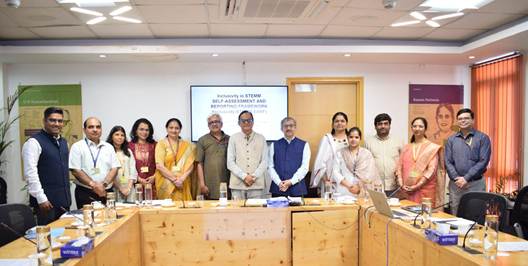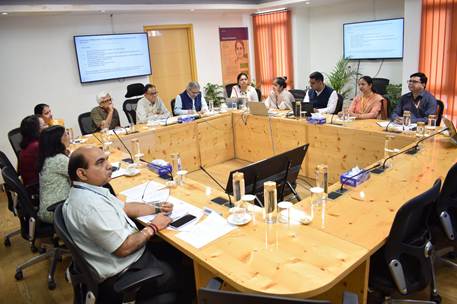Office of Principal Scientific Advisor to GoI
PSA Prof. Ajay Sood Chairs Meeting to discuss the Operationalisation of the Inclusivity in STEMM Self-Assessment and Reporting Framework
Posted On:
28 MAY 2025 6:09PM by PIB Delhi
The Office of the Principal Scientific Adviser to the Government of India convened a high-level meeting on May 28, 2025 to discuss the operationalisation of the Self Assessment and Reporting Framework on Inclusivity in Science, Technology, Engineering, Mathematics, and Medicine (Inclusivity-STEMM-SARF) prepared by the Office in consultation with diverse stakeholders. Chaired by Prof. Ajay Kumar Sood, Principal Scientific Adviser to the Government of India, the meeting was joined by Dr. R Balasubramaniam, Member (HR), Capacity Building Commission; Shri Vineet Joshi, Secretary, Department of Higher Education; Dr. Parvinder Maini, Scientific Secretary, Office of the Principal Scientific Adviser to the Government of India; Ms. Soumya Gupta, Joint Secretary (Technical Education), Department of Higher Education; Ms. Navanita Gogoi, DDG (Statistics), Department of Higher Education; Dr. Amit Dutta, Director, Policy & Academic Planning Bureau, All India Council for Technical Education. The SARF exercise is being taken up for implementation jointly by the Office of the Principal Scientific Adviser (OPSA), the Capacity Building Commission (CBC), the Department of Higher Education (DHE), and the All India Council for Technical Education (AICTE).

PSA opened the meeting by stating the significance of having a STEMM ecosystem that will help address the nuanced gaps that exist with respect to inclusivity. “Inclusivity in STEMM is not just a moral imperative, but also a scientific and developmental one. Diverse perspectives drive better innovation, more relevant research, and equitable outcomes,” said Prof. Sood. He further underlined that in the Indian context, with our demographic diversity and socio-economic complexity, building inclusive scientific ecosystems is both a challenge and a necessity. The framework, along with gender equity, also talks about critical aspects such as socio-economic, linguistic and epistemic diversity, etc., while also delving into critical dimensions such as just, ethical, and open science.
“While the principles of inclusivity are globally acknowledged, their implementation is highly uneven, varying by country, sector, and discipline. India’s unique socio-cultural context compels us to develop a more deliberate and locally rooted model of inclusivity in STEMM,” stated Dr. Maini. OPSA has been committed to this vision through its initiatives like I-STEM, RuTAG, the One Health Mission, One Nation One Subscription, and the National Livelihood Mission, each reflecting inclusivity in action. Dr. Maini also emphasised the need for a structured, integrated, and measurable approach, something that can enable institutions to assess themselves, benchmark progress, and identify gaps. This is what led to the inception of the Inclusivity-STEMM Self-Assessment and Reporting Framework.
The idea was seeded during the 2023 G20 Chief Science Advisers’ Roundtable (CSAR), where Inclusivity in S&T emerged as a core agenda. There was a strong consensus on the need to address systemic inequalities, foster plurality of knowledge and ensure linguistic and epistemic diversity. To translate these global insights into actionable steps for India, a position paper was drafted, outlining priority dimensions of inclusivity most relevant to India’s STEMM ecosystem, which further evolved through extensive collaborations and consultation. OPSA developed this Inclusivity-STEMM SARF as an effort to bring structure, insights, and accountability into how institutions approach inclusivity.

During the meeting, Dakshata Lingayat from OPSA gave a presentation capturing the overview of the framework and its parameters, its evolution in terms of the stakeholder consultation process, and proposed action points. Recognising the unique characteristics of India’s STEMM ecosystem, the framework moves beyond a ‘one-size-fits-all’ approach. It draws from global best practices while tailoring them to India's specific needs through both conceptual and contextual understanding.
In his address, Dr. Balasubramaniam, Member (HR-CBC) underscored the importance of developing a structured capacity-building module around the proposed framework and embedding it within the governance architecture. He emphasised that the framework for inclusivity in the STEMM ecosystem goes beyond representation, aiming to foster institutional excellence. Dr. Balasubramaniam further noted that, once piloted and validated, the framework holds the potential to serve as a benchmark model for countries across the Global South.
Shri Vineet Joshi, Secretary, DHE, highlighted the intersectionality of the five parameters of this framework and reiterated that the pilot should capture social, geographical and economic aspects of inclusivity. Further in their presentation, Ms Navanita Gogoi, DHE shared the overview of the All India Survey on Higher Education (AISHE) database and its aspects related to inclusivity.
Dr. Amit Dutta, Director, Policy & Academic Planning Bureau, AICTE, endorsed the Framework and talked about the importance of having good representation from technical institutions that come under AICTE.
The meeting concluded with key decisions to advance the Inclusivity-STEMM-SARF initiative. It was decided that a Self-Assessment and Reporting Framework will be piloted with an appropriate pilot strategy jointly with DHE. A capacity-building module on inclusivity in STEMM will be co-developed with CBC. To oversee and coordinate these efforts, a joint working group comprising representatives from the OPSA, DHE, CBC, and AICTE will be constituted.
***
MJPS/ST
(Release ID: 2132124)